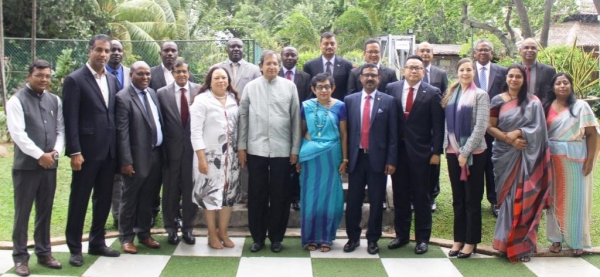The First Meeting of IORA Maritime Safety and Security (MSS) Working Groupchaired by Sri Lanka and held in Colombo on 8-9 August with the participation of 22 foreign delegates representing IORA member countries and representatives of the IORA Secretariat has finalized the Work Plan for action.
Inaugurating the meeting Foreign Secretary RavinathaAryasinha recalling Sri Lanka’s role in spearheading the Indian Ocean Peace Zone proposal in 1971, said at the time few recognized the importance of the concept. He saidit was pleasing to note that times have changed. The Indian Ocean has today been acknowledged as one of the world’s busiest and most critical trade corridors, carrying two-thirds of global oil shipments and a third of bulk cargo and hosting the most critical Sea Lanes of Communication (SLOCs), directly impacting global trade and economy. Sri Lanka as a country central to this region, while protecting its self-interest, is keen to ensurefreedom of navigationand lines of communication, which were an essential prerequisite not only to maintaining regional security and stability, but is also crucial for the future prosperity of the region. He said “The Indian Ocean: Defining Our Future” multilateral diplomatic engagement hosted by Sri Lanka last year which brought together not only the Indian Ocean littoral states, but also its maritime users, was an expression of this commitment.
The meeting chaired by Director General of Ocean Affairs, Environment and Climate Change of the Ministry of Foreign Affairs,HasanthiUrugodawatteDissanayake, was an intense exercise to agree on a Work Plan on consensus basis of a 50-page document. The Work Plan for an initial period of 02 years, was based on 03 overarching objectives; building the foundation for a collaborative IORA MSS Framework, establishing an integrated policy approach on MSS, and establishing a Coordinated Regional Vision for MSS in IORA to address existing and emerging issues.Sri Lanka, as the Coordinating Country would take the lead in assessing progress of the implementation of the MSS Blue Print and the activities agreed upon under the Work Plan on MSS. Further, Sri Lanka also offered to undertake to support member states in capacity building related to anti-piracy and SAR activities as well as engaging in research connected to specific MSS challenges. In the long term, considering Sri Lanka’s geo-strategic location and existing cordial relations with all Indian Ocean littoral states, Sri Lanka reiterated its interest in setting up a Regional Maritime Information Fusion Centre in southern Sri Lanka to complement similar centres in Madagascar and Singapore.
In the context of traditional and non-traditional threats connected to maritime safety and security and emerging new maritime architectures, particularly related to the Indian Ocean, a Panel Discussion moderated by Executive Director, LakshmanKadirgamar Institute of International Relations and Strategic Studies,Dr. GaneshanWignaraja, on “Emerging Scenarios Safety and Security in the Indian Ocean” was held. Panelists included former Legal Advisor of the Ministry of Foreign Affairs of Sri Lanka and former Sri Lanka’s Permanent Representative to the United Nations, Dr. RohanPerera, Deputy Chief of Staff and Director General Operations, Sri Lanka Navy,Rear Admiral N. P. S. Attygalle, and Head of Global Maritime Crime Programme, United Nations Office on Drug and Crimes, Mr. Alan Cole.
The event provided a forum for member states to discuss collective priorities in the spheres of maritime safety and security. It further gave an opportunity to build the foundation for a collaborative and integrated IORA Maritime Safety and Security framework based on the needs and pr










